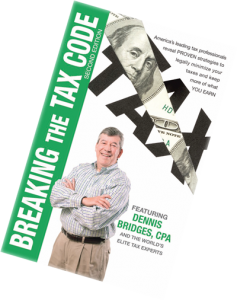Looking Ahead to 2019 Taxes
You have your 2018 tax return filed, or perhaps on extension, and now it is time to look forward to [...]





 “Breaking The Tax Code, 2nd Ed. is designed to help people keep more of their hard-earned money and will feature advice from top financial professionals and experts from across the country. These authors will reveal tax secrets and strategies to help people from all walks of life “break the tax code” and keep more of what they earn.”
-- Celebrity Press, December 9, 2011
“Breaking The Tax Code, 2nd Ed. is designed to help people keep more of their hard-earned money and will feature advice from top financial professionals and experts from across the country. These authors will reveal tax secrets and strategies to help people from all walks of life “break the tax code” and keep more of what they earn.”
-- Celebrity Press, December 9, 2011December 7th, 2013
December 7th, 2013
December 7th, 2013
December 7th, 2013
E. Dennis Bridges, CPA | 234 Creekstone Ridge,
Woodstock, GA 30188 | (770) 984-8008
© Copyright 2014 – E. Dennis Bridges, CPA – All Rights Reserved